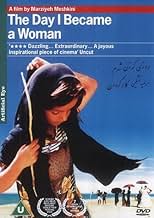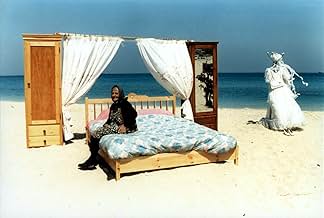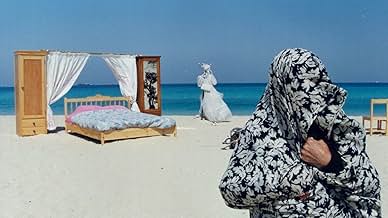IMDb-BEWERTUNG
7,3/10
2078
IHRE BEWERTUNG
Füge eine Handlung in deiner Sprache hinzuThree linked stories show women at life's crossroads: a girl's 9th birthday, a cycling race, and an elderly woman's dream of buying long-desired items.Three linked stories show women at life's crossroads: a girl's 9th birthday, a cycling race, and an elderly woman's dream of buying long-desired items.Three linked stories show women at life's crossroads: a girl's 9th birthday, a cycling race, and an elderly woman's dream of buying long-desired items.
- Regie
- Drehbuch
- Hauptbesetzung
- Auszeichnungen
- 10 Gewinne & 5 Nominierungen insgesamt
Empfohlene Bewertungen
On the surface this film tells three simple stories, but its simplicity is deceiving. Each story tells an episode in the life of a woman but as the woman ages the stories become more and more surreal. In so doing Marzieh Meshkini is making a parallel with the life of Iranian women.
Absolutely stunning. On the surface it's a triptych of short stories showing a girl, young wife, and old woman in Iran, but it plays as allegory, and the way it's executed by director Marzieh Meshkini is masterful. She shows great restraint and precision in everything she does, delivering a message with enough ambiguity to make the viewer ponder, and yet clearly showing the constraints of being a woman in a male-dominated society. The middle story in particular was as poetic and profound an expression of the patriarchy as I've ever seen; it was simply breathtaking. This is a film that should be far better known and seen; seek it out.
I saw "Roozi khe zan shodam" ("The Day I Became a Woman") a few days ago during the Memorial Day holiday. It was a good film with strong, subtle acting and quite interesting camera shots.
In a nutshell, the film is about women in contemporary Iran. It depicts compelling accounts about a girl who has just turned nine and is now therefore considered to be a woman and expected to leave childhood play behind; a woman's bicycle race and the strong objection a husband has to his wife's participation; and an elderly woman who has in earlier life deferred her desires to buy consumer goods and finally has the opportunity to realize her spending dreams.
Without having lived in or even visited Iran, I can't judge the realism of "Roozi khe zan shodam". The camera offers us an innocent, child-like eye, just observing these characters and leaving us to draw our own conclusions. I particularly enjoyed the cinematography of the mass of women cyclists, all clad in black practically head to foot, pedaling away almost entirely in silence except for the rhythmic pedaling noises; and the parallel shots focusing on the legs of the galloping horses, carrying the complaining husband and his cohorts. The pedaling wife Ahoo (Shabnam Tolui) never speaks a word, but her focused and desperate efforts indicate her quest for increased independence. I also enjoyed following the activities of 9-year-old Hava (Fatemeh Cherag Akhar).
I would see "Roozi khe zan shodam" again for its cinematography and the unique (at least for Western audiences) life experiences depicted. It's by no means Hollywood fare or even overtly feminist, but allows the viewer to settle in for a bit of (realistic or stylized?) local color and look at perspectives there of women in three different stages in their lives.
In a nutshell, the film is about women in contemporary Iran. It depicts compelling accounts about a girl who has just turned nine and is now therefore considered to be a woman and expected to leave childhood play behind; a woman's bicycle race and the strong objection a husband has to his wife's participation; and an elderly woman who has in earlier life deferred her desires to buy consumer goods and finally has the opportunity to realize her spending dreams.
Without having lived in or even visited Iran, I can't judge the realism of "Roozi khe zan shodam". The camera offers us an innocent, child-like eye, just observing these characters and leaving us to draw our own conclusions. I particularly enjoyed the cinematography of the mass of women cyclists, all clad in black practically head to foot, pedaling away almost entirely in silence except for the rhythmic pedaling noises; and the parallel shots focusing on the legs of the galloping horses, carrying the complaining husband and his cohorts. The pedaling wife Ahoo (Shabnam Tolui) never speaks a word, but her focused and desperate efforts indicate her quest for increased independence. I also enjoyed following the activities of 9-year-old Hava (Fatemeh Cherag Akhar).
I would see "Roozi khe zan shodam" again for its cinematography and the unique (at least for Western audiences) life experiences depicted. It's by no means Hollywood fare or even overtly feminist, but allows the viewer to settle in for a bit of (realistic or stylized?) local color and look at perspectives there of women in three different stages in their lives.
10jakub66
Having followed Iranian cinema for a while I didn't think I was in for a surprise but Meshkini (director) managed to blow me away with the minimalist approach to depicting the fundamental issues of Iranian society. The elegance, minimalism and eloquence of this picture manage to depict the role of a woman in Iran with painful clarity.
"Roozi khe zan shodam" is an essential and defining piece of cinema.
"Roozi khe zan shodam" is an essential and defining piece of cinema.
This is a beautifully shot, richly textured film. Its decidedly surrealist elements do not detract from its poignant central message: that the arbitrary social conventions which govern womens' lives in Iran are inherently absurd. What is so striking about this film is the way in which the director brings out this element of absurdity by transplanting an Iranian narrative onto the bizarre setting of Kish Island, a free trade zone and resort off the coast of Iran. The women in the film are all forced to play out the roles assigned for them by Iranian society, despite the virtual absence of the state, which is so often demonized in treatments of Iranian women's lives.
Wusstest du schon
- WissenswertesMarzieh Makhmalbaf's directorial film debut.
- PatzerIn the first sequence, the lollipop that Hava and Hassan pass between them grows and shrinks in size without regard to the passage of time.
- Zitate
Grandmother: Will you promise to be back by noon?
Hava: I promise!
Grandmother: God won't forgive you if you lie. Don't be late.
- VerbindungenFeatured in Women Make Film: A New Road Movie Through Cinema (2018)
Top-Auswahl
Melde dich zum Bewerten an und greife auf die Watchlist für personalisierte Empfehlungen zu.
Details
- Erscheinungsdatum
- Herkunftsland
- Offizielle Standorte
- Sprache
- Auch bekannt als
- The Day I Became a Woman
- Drehorte
- Kish Island, Iran(location)
- Produktionsfirmen
- Weitere beteiligte Unternehmen bei IMDbPro anzeigen
Box Office
- Budget
- 180.000 $ (geschätzt)
- Bruttoertrag in den USA und Kanada
- 149.971 $
- Eröffnungswochenende in den USA und in Kanada
- 48.255 $
- 8. Apr. 2001
- Weltweiter Bruttoertrag
- 149.971 $
Zu dieser Seite beitragen
Bearbeitung vorschlagen oder fehlenden Inhalt hinzufügen

Oberste Lücke
By what name was Der Tag an dem ich zur Frau wurde (2000) officially released in India in English?
Antwort


















